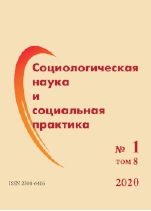Спортивные победы как ценность, объединяющая россиян (на примере зимних Олимпийских игр Сочи–2014)
Аннотация
Литература
Дулина Н. В., Икингрин Е. Н., Никифорова А. А. Отношение студентов страны к Олимпийским играм в Сочи: общее и особенное (по итогам социологического исследования) // Россия: тенденции и перспективы развития. 2015. ИНИОН РАН. 10. Ч. III. С. 166–170.
Зимняя Олимпиада в Сочи: пять лет спустя [Электронный ресурс] // ВЦИОМ: [сайт]. Пресс-выпуск № 3914 от 26.03.19. URL: https://wciom.ru/index.php?id=236&uid=9616 (дата обращения: 22.04.2019).
Кузнецов Д. В. Массовое сознание в современном российском обществе: социально-философский анализ: дис. на соиск. учён. степ. канд. филос. наук: специальность 09.00.11 «Социальная философия» / Кузнецов Денис Владимирович; Моск. гос. ун-т им. М. В. Ломоносова. М., 2005. 170 c.
Межуев В. М. Идея культуры: Очерки по философии культуры. М.: Прогресс-Традиция, 2006. 326 c.
О’Махоуни М. Спорт в СССР: физическая культура, визуальная культура / пер. с англ. Е. Лямина, А. Фишман. М.: Новое литературное обозрение, 2010. 304 с.
Паначев В. Д. Спорт как социальный институт в развитии личности: дис. на соиск. учён. степ. канд. социол. наук: специальность 22.00.04 «Социальная структура, социальные институты и процессы» / Паначев Валерий Дмитриевич; Пермский гос. технич. ун-т. Пермь, 2000. 230 c.
Ethnic Groups and Boundaries. The Social Organization of Culture Differences / Ed. by F. Barth. Bergen; London, 1989. 395 р.
Ethnic Identity: Cultural Continuities and Change / Ed. by G.de Vos., l. Romanucci-Ross. Chicago; London, 1982. 395 р.
Snyder E., Spreitzer E. Social Aspects of Sport. New Jersey: Prentice-Hall, 2003. 350 р.
Поступила: 30.11.2019
Опубликована: 01.04.2020








 Издатель: Федеральное государственное бюджетное учреждение науки
Издатель: Федеральное государственное бюджетное учреждение науки